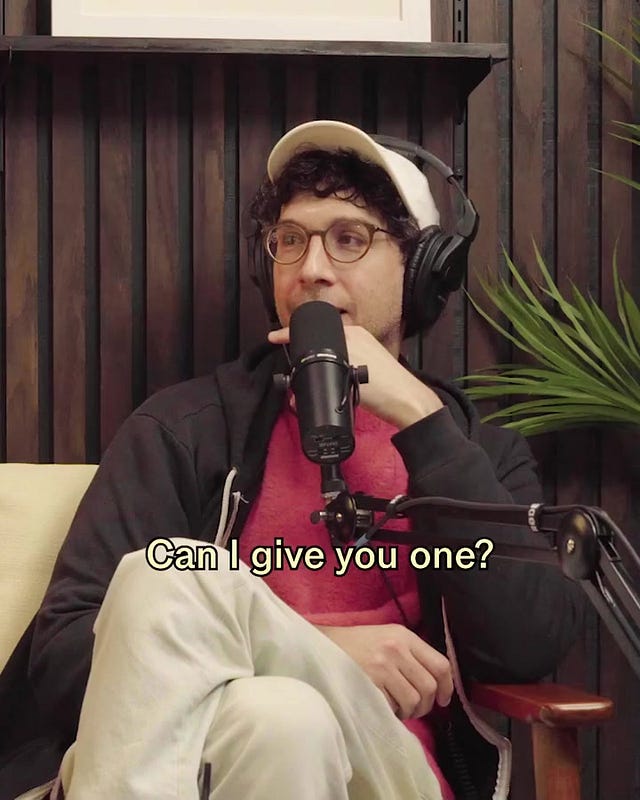Learning, re-learning, un-learning (Ricky Weekly #100)
This is where I share 3 things every week with my friends and anyone else interested.
—
A picture from my life:
Went on a breakfast date with my friends’ kid (and her parents). We loved watching bigger kids and trains go by!
A thing on my mind:
I’m at Thorough Bread and Pastry enjoying their almond croissant (one of the bests in the city). This is my 100th Ricky Weekly. Even though it hasn’t been a “weekly” for some time, it still gives me joy whenever I make the time to write what’s on my mind to share with you all. The fun is in how writing helps me think. I always have a lot of thoughts swirling around in my head. They keep swirling because I feel like if I just pull on their threads a little more, they’ll reveal something about themselves that will change the way I see the world.
I had mentioned that I might stop writing this newsletter at No. 100. The thinking at the time was to pivot myself into higher impact projects in my free time. I crave impact and was belittling this newsletter for its mostly selfish nature, but maybe that’s too harsh. When I look at all the things that make me happy, writing for fun is right up there near the top. The desire for higher-impact work is still burning, so I’ll do that anyway, but I’ll also keep writing here.
So, what’s been on my mind?
I’ve been re-learning that I have agency. A new friend was remarking that I am a high-agency person, which matches my own self-narrative. But a closer examination would show that I contradict myself and act low-agency in lots of situations. If there’s benefit to choosing differently to produce a better result and I don’t choose it, that’s infuriating. Of course, easier said than done. Being high-agency feels virtuous because it’s hard, like waking up at 5 and starting your day with a workout. It’s not the end-all, be-all of course. Nothing ever is. But re-learning that I have agency in many more situations helps me practice it more frequently.
I’m un-learning that I have to hold myself to sky high expectations in all aspects of life. For as long as I can remember, I’ve set a very high bar for myself. The reasons are complicated, but the consequence is I’m always failing and beating myself up over it. I was watching the latest season of F1: Drive To Survive, and Fred Vasser described Charles Leclerc as “over-motivated” and that struck a chord. Obviously very different context but the idea that you can be “over-motivated” is a nice reminder. In an email with my friend Jason Shen, he wrote, “Research shows that beginners need positive feedback and reinforcement, while experts benefit more from constructive criticism about gaps they need to address” as a way of reminding me that I can be more adaptive with how I set expectations to not deprive myself from ever being a beginner. I’m a beginner in almost everything I try to do!
I’m learning that I might have an “addictive personality.” I was being very self-critical with my fitness coach about falling off the weight management horse for two weeks when it was only supposed to be a weekend. Not the first time it’s happened, so he pointed out that I may have an addictive personality and will experience more polarized behaviors. For example, after two years of work, I got to a point when I’m “on” (the proverbial horse) I can stay very disciplined and eat a healthy diet, but when I’m “off” I swing hard in the other direction and engage in unhealthy behavior that can verge on disordered eating. Depending on how long I had to stay disciplined, what my brain needs to feel like I’m really off is a lot more than just a cheat meal or two or three. Combine that with the addictive chemicals in bad food and my other addiction to beating myself up when I’m down…things can get out of hand. I’m not sure if “addictive personality” is even a real thing but it does explain a lot outside of my relationship with food and why I prefer a simplicity, a bit of structure, and minimal living. Either way, it’s useful learning to help inform adaptive strategies.
A piece of content I recommend:
An Expertise Acceleration Experiment in Judo and Mental Strength in Judo, Mental Strength in Life by Cedric Chin
It was intriguing to read about someone’s journey to compete in high-level Judo in their mid-30s after taking more than a decade off from the sport. The most striking part to me was how the author’s coach identified “mental strength” to be a limiter to his progress. The author writes a successful business blog, which takes mental strength to accomplish, so I would’ve thought the same mental strength would translate to working on Judo if he’s completely dedicated to it. That’s too simplistic. This is what got me to email my friend Jason who knows the author, and he reminded me that our attributes (eg mental strength) are domain-specific.
Bonus Content: Court of Gold on Netflix
USA vs Serbia and USA vs France were two of the best games I’ve ever watched in my life so just to re-live those two games would’ve made this worth watching but it definitely delivered way more. If you love basketball, you’ll love this. Fuck it we ball.
Bonus Content 2: Another Harry Mack Freestyle. Enjoy!
🤗
—
As always, you can find out what I’m thinking in more real-time on Twitter and my essays are on my website. My primary focus (and where I focus) is on Flow Club.





